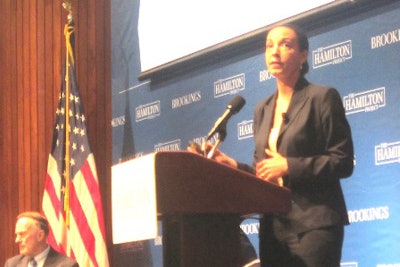 Caroline Hoxby
Caroline HoxbyWASHINGTON — In an event on Wednesday organized by the Brookings Institution’s Hamilton Project, noted Stanford University economist Caroline M. Hoxby unveiled a national proposal aimed at encouraging high-achieving, low-income students to apply to and attend selective colleges. The plan, devised by Hoxby and Dr. Sarah Turner of the University of Virginia, is based on the Expanding College Opportunities (ECO) Project, which was developed by the economists and has demonstrated promising results.
At the National Press Club in downtown Washington, D.C., Hoxby presented research findings on the ECO Project during a forum event billed as “The Economic Imperative of Expanding College Opportunity. Following Hoxby’s presentation and participation in a roundtable discussion, higher education leaders on a second panel, including the heads of the College Board and the ACT testing organizations, expressed support for the ECO Project.
Hoxby told the National Press Club audience that she, Turner and Harvard Kennedy School professor Christopher Avery had been “working for a number of years on understanding why it is that low-income students who are high achieving are so much less likely to go to very selective colleges and universities” than students from middle- and upper-income families. As a result, the ECO Project focused on providing “targeted, customized information about the college application and selection processes to help improve the choices of low-income, high-achieving students” and measured the outcomes for more than 40,000 participants.
Low-income students receiving the customized and targeted information were 50 percent more likely to attend a peer institution, or an institution to which their qualifications matched them, than the low-income students who had not gotten the specialized information, Hoxby said.
“The results of the ECO experiment were striking. Armed with the information and no-paperwork fee waivers in the ECO intervention, low-income high achievers applied to, were admitted to and matriculated at schools with greater resources, higher graduation rates and curricula more oriented to their preparation,” according to a discussion paper by Hoxby and Turner produced for the Hamilton Project.
The Hamilton Project, which is an economic policy initiative launched by the Brookings Institution think tank in 2006, released the paper and a policy brief by Hoxby and Turner. Both documents are titled Informing Students about Their College Options: A Proposal for Broadening the Expanding College Opportunities Project. In addition, the project on Wednesday released a study titled Thirteen Economic Facts about Social Mobility and the Role of Education.
In their policy proposal, Hoxby and Turner urge that efforts to sustain and to make the ECO Project more effective do the following:
1) Establish or partner with credible third parties for implementing and extending the ECO Project;
2) Expand the ECO intervention to serve more high-achieving, low-income students through partnerships with the College Board and ACT;
3) Improve targeting and effectiveness of the intervention by providing ECO researchers with better access to data;
4) Apply similar interventions to different students and outcomes;
5) Support rigorous research on information-based interventions.
As a roundtable discussant with Hoxby, William Fitzsimmons, dean of admissions and financial aid at Harvard College, praised the accomplishment and the aims of the ECO Project. “The [ECO Project] is a very good program. It does give people crucial information,” he told the forum audience.
During “The Role of Higher Education in American Mobility” roundtable discussion, David Coleman, president of the College Board, and Jon Whitmore, CEO of Act, Inc., respectively pledged to get their testing organizations behind the ECO Project.
“We’re new to ECO Project. … We have some exciting ideas about new efforts at ACT that can fit into and maybe enhance [the ECO] program,” Whitmore said.
Other discussion participants with Coleman and Whitmore were Dr. Nancy Cantor, chancellor and president of Syracuse University and Dr. William F. Kirwan, chancellor and CEO of the University System of Maryland.


















